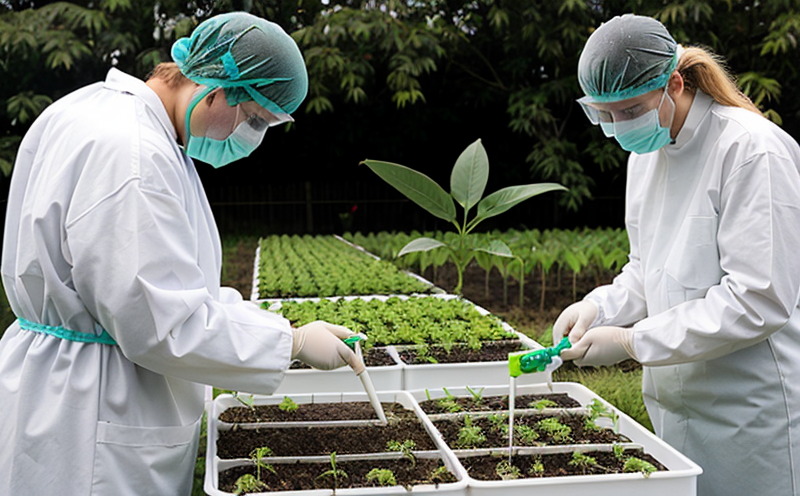Alternaria Species Detection in Crops
The Alternaria species detection in crops service is a critical component of plant pathology and disease management. Alternaria is a genus of fungi that can cause significant damage to various agricultural crops, leading to reduced yield and quality. Accurate identification and early detection of these pathogens are essential for implementing effective control measures.
The Alternaria species include several important fungal pathogens such as Alternaria alternata, Alternaria brassicae, and Alternaria solani. Each species has distinct characteristics that affect different crops, making accurate identification crucial for precise management strategies. This service focuses on detecting these species using advanced molecular biology techniques like PCR (Polymerase Chain Reaction) and DNA sequencing.
Our laboratory uses state-of-the-art equipment such as real-time quantitative PCR machines, which can provide rapid results within a few hours. The process begins with the collection of plant samples from fields or greenhouses suspected of being infected by Alternaria. Samples are then processed to extract DNA, followed by amplification and analysis using specialized software.
The detection method is based on specific primer sequences targeting regions unique to each Alternaria species. This allows for precise identification even in mixed infections where multiple species may be present simultaneously. Once the PCR products are generated, they undergo further analysis through gel electrophoresis or capillary electrophoresis if necessary.
The results from this testing service provide valuable information to agricultural producers and researchers about potential threats posed by Alternaria. This knowledge can help them make informed decisions regarding crop protection measures such as fungicide application timing, variety selection, and cultural practices that minimize disease risk.
In addition to aiding in the diagnosis of current issues, this service also contributes significantly towards sustainable agricultural practices. By identifying pathogen presence early, farmers can avoid unnecessary chemical treatments while still ensuring plant health. Furthermore, understanding which species are present helps tailor more effective control strategies tailored specifically for those pathogens.
- Reduction in pesticide usage: Knowing exactly what species of Alternaria is affecting crops allows growers to apply targeted treatments rather than broad spectrum fungicides.
- Promotion of biodiversity: Implementing integrated pest management approaches reduces reliance on chemical controls, promoting beneficial microbial communities within soils and plants.
- Enhanced resource efficiency: Accurate diagnosis enables optimized use of resources such as water and fertilizer by avoiding overapplication due to perceived disease pressure.
Accurate identification and timely intervention not only protect crops but also contribute positively towards environmental conservation efforts. By minimizing chemical inputs and promoting natural resistance mechanisms within plants, this service supports a more sustainable approach to agriculture.
Industry Applications
The detection of Alternaria species in crops has wide-ranging applications across the agricultural sector. Quality managers rely on accurate identification to ensure product consistency and safety throughout supply chains. Compliance officers use this service as part of their broader regulatory compliance programs, ensuring adherence to international standards like ISO 17025 for laboratory accreditation.
R&D engineers benefit greatly from such detailed information when developing new varieties or improving existing ones. They can better understand how different Alternaria species interact with various genetic backgrounds, leading to more resilient and productive crops. Procurement teams also find value in this service as they evaluate suppliers based on their ability to deliver disease-free produce.
This testing is particularly important for specialty crop growers who need to maintain high standards of quality and purity. For example, organic farmers must prove that their products meet strict guidelines regarding pesticide use and pathogen presence. In addition, exporters face stringent requirements ensuring compliance with importing countries' regulations on plant health.
By providing reliable data about Alternaria species present in crops, our service supports these diverse stakeholders in achieving their goals. It ensures that all parties involved in crop production and distribution have access to the same level of transparency and reliability regarding disease status.





